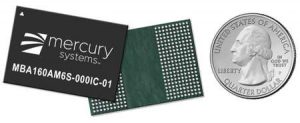TRRUST-Stor Defense Small Secure SSD With Self-Destruct Capability in BGA Package From Mercury Systems
Up to 256GB, with Armor 6 processor, integrating certified cryptographic algorithms, encryption key purge, device sanitization and non-thermal self-destruct capabilities
This is a Press Release edited by StorageNewsletter.com on May 8, 2018 at 3:12 pmMercury Systems, Inc. announced the beginning of customer engagements for its TRRUST-Stor secure SSD optimized for embedded computing applications in forward-deployed defense environments.
TRRUST-Stor ball-grid array SSD

Available in host-accessible capacities up to 256GB, this device features TLC NAND flash memory operating in SLC mode combined with BuiltSECURE algorithms in a ruggedized, ultra-compact 22x32mm ball-grid array (BGA) package. The device’s ARMOR 6 processor integrates certified cryptographic algorithms, encryption key purge, device sanitization and non-thermal self-destruct capabilities into a single device. This low-profile SSD device is for applications requiring on-board high-speed, secure storage in SWaP-constrained environments such as aircraft, unmanned systems and mobile ground applications including secure laptops and tablets.
The increase in critical sensor data collected by modern defense computing systems burdens embedded board design engineers to integrate on-board storage solutions for maximum space savings without sacrificing storage capacity, performance, speed or security. A multifaceted approach to the implementation of security is required to address all possible operating scenarios. Encryption technologies free of key bypass mechanisms must be paired with advanced key management techniques and device sanitization protocols. Achieving this objective ensures that access to high-value data is restricted only to those individuals with proper authorization.
While TLC flash technology is for high-capacity storage in a smaller footprint than MLC and SLC technologies, its reliability and performance in military operating environments has been disputed until today. The company has eliminated these threats by custom-engineering a new variant of its ARMOR processor specifically for this commercial memory technology enabling it to operate in SLC mode for high reliability and long-term endurance while sustaining high-speed R/W operations. Additionally, the firm has successfully embedded a suite of customizable self-destruct protocols that are initiated and executed without the use chemical reactionsor heat. These protocols safely render the device inoperable in the event of device capture and reverse-engineering attempts by adversaries.
“Our new ultra-compact SSD device blends the most advanced commercial flash memory technology, our core expertise in advanced packaging and our new BuiltSECURE algorithms to deliver assured data integrity in harsh operating environments,” said Iain Mackie, VP and GM, microelectronics secure solutions group, Mercury. “It is our duty to deliver the best commercial technologies to the defense community without compromising security, performance or data integrity. We are proud to leverage Mercury’s next-generation business model to commercialize this innovation for our military forces around the world.“
The firm’s ARMOR processor and its entire portfolio of secure storage solutions are designed and manufactured in a Defense Microelectronics Activity (DMEA)-accredited facility for design, packaging, test and broker services. The company’s unwavering commitment to security extends far beyond product design and manufacturing, into the cadence of its daily operations. Several of the firm’s facilities have been recognized for excellence by receiving a superior rating from the Defense Security Service (DSS).
The company’s application engineering team is ready to assist customers with the integration of the TRRUST-Stor SSD into their complex embedded computing environments.













 Subscribe to our free daily newsletter
Subscribe to our free daily newsletter

